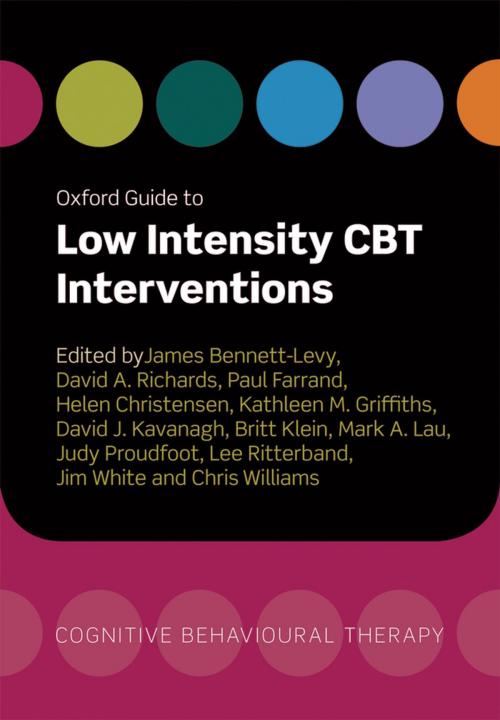Oxford Guide to Low Intensity CBT Interventions
Nonfiction, Health & Well Being, Psychology, Clinical Psychology, Medical| Author: | ISBN: | 9780191015571 | |
| Publisher: | OUP Oxford | Publication: | May 13, 2010 |
| Imprint: | OUP Oxford | Language: | English |
| Author: | |
| ISBN: | 9780191015571 |
| Publisher: | OUP Oxford |
| Publication: | May 13, 2010 |
| Imprint: | OUP Oxford |
| Language: | English |
Mental disorders such as depression and anxiety are increasingly common. Yet there are too few specialists to offer help to everyone, and negative attitudes to psychological problems and their treatment discourage people from seeking it. As a result, many people never receive help for these problems. The Oxford Guide to Low Intensity CBT Interventions marks a turning point in the delivery of psychological treatments for people with depression and anxiety. Until recently, the only form of psychological intervention available for patients with depression and anxiety was traditional one-to-one 60 minute session therapy - usually with private practitioners for those patients who could afford it. Now Low Intensity CBT Interventions are starting to revolutionize mental health care by providing cost effective psychological therapies which can reach the vast numbers of people with depression and anxiety who did not previously have access to effective psychological treatment. The Oxford Guide to Low Intensity CBT Interventions is the first book to provide a comprehensive guide to Low Intensity CBT interventions. It brings together researchers and clinicians from around the world who have led the way in developing evidence-based low intensity CBT treatments. It charts the plethora of new ways that evidence-based low intensity CBT can be delivered: for instance, guided self-help, groups, advice clinics, brief GP interventions, internet-based or book-based treatment and prevention programs, with supported provided by phone, email, internet, sms or face-to-face. These new treatments require new forms of service delivery, new ways of communicating, new forms of training and supervision, and the development of new workforces. They involve changing systems and routine practice, and adapting interventions to particular community contexts. The Oxford Guide to Low Intensity CBT Interventions is a state-of-the-art handbook, providing low intensity practitioners, supervisors, managers commissioners of services and politicians with a practical, easy-to-read guide - indispensible reading for those who wish to understand and anticipate future directions in health service provision and to broaden access to cost-effective evidence-based psychological therapies.
Mental disorders such as depression and anxiety are increasingly common. Yet there are too few specialists to offer help to everyone, and negative attitudes to psychological problems and their treatment discourage people from seeking it. As a result, many people never receive help for these problems. The Oxford Guide to Low Intensity CBT Interventions marks a turning point in the delivery of psychological treatments for people with depression and anxiety. Until recently, the only form of psychological intervention available for patients with depression and anxiety was traditional one-to-one 60 minute session therapy - usually with private practitioners for those patients who could afford it. Now Low Intensity CBT Interventions are starting to revolutionize mental health care by providing cost effective psychological therapies which can reach the vast numbers of people with depression and anxiety who did not previously have access to effective psychological treatment. The Oxford Guide to Low Intensity CBT Interventions is the first book to provide a comprehensive guide to Low Intensity CBT interventions. It brings together researchers and clinicians from around the world who have led the way in developing evidence-based low intensity CBT treatments. It charts the plethora of new ways that evidence-based low intensity CBT can be delivered: for instance, guided self-help, groups, advice clinics, brief GP interventions, internet-based or book-based treatment and prevention programs, with supported provided by phone, email, internet, sms or face-to-face. These new treatments require new forms of service delivery, new ways of communicating, new forms of training and supervision, and the development of new workforces. They involve changing systems and routine practice, and adapting interventions to particular community contexts. The Oxford Guide to Low Intensity CBT Interventions is a state-of-the-art handbook, providing low intensity practitioners, supervisors, managers commissioners of services and politicians with a practical, easy-to-read guide - indispensible reading for those who wish to understand and anticipate future directions in health service provision and to broaden access to cost-effective evidence-based psychological therapies.















